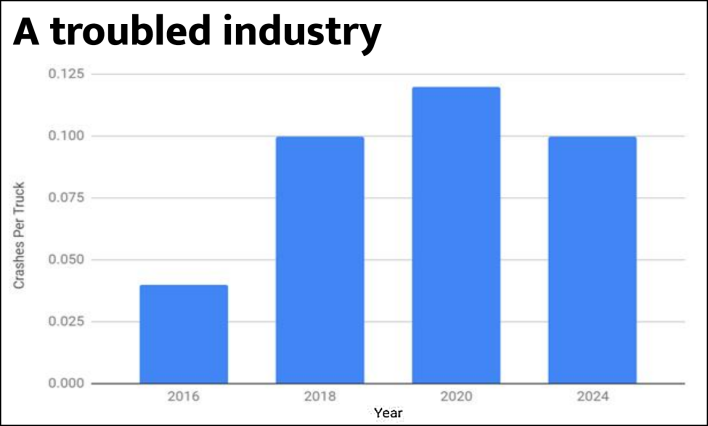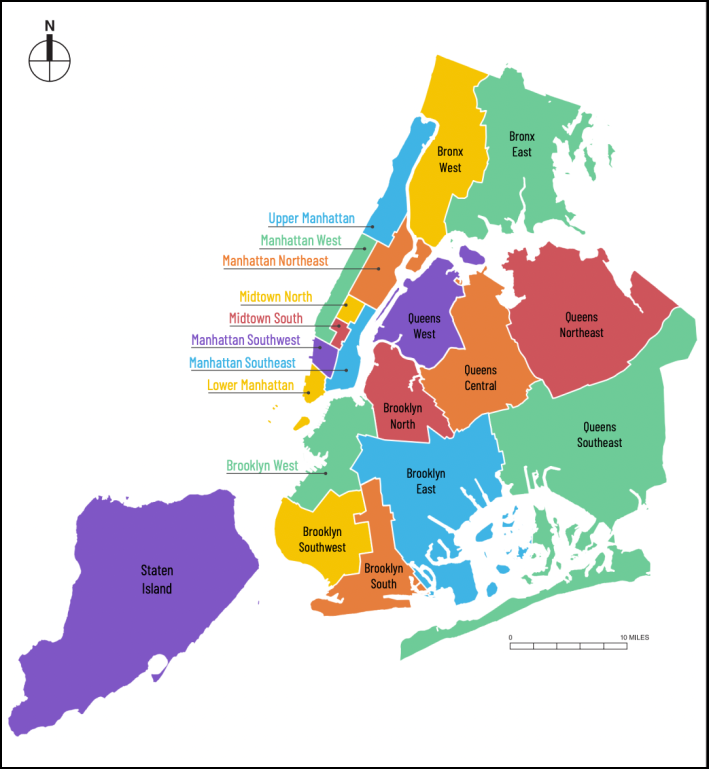New York City's private trash industry wreaks as much deadly havoc on the streets as it did five years ago when lawmakers passed still-unimplemented reforms for the chaotic sector, according to a new report.
The rate of crashes per trash truck is as high today as it was in 2018, while injuries and deaths caused by private sanitation truck collisions remain in line with levels before officials struck a deal to organize the industry into 20 commercial waste zones in 2019, the Transform Don't Trash Coalition of advocates for safe streets, unions, and environmentalists found.
Lawmakers passed the five-year-old reforms to reduce the vehicle miles of the then-anarchic industry, whose 90-odd companies routinely killed New Yorkers as they criss-crossed the city every night to collect trash from a hodgepodge of disparately located commercial businesses. The reforms empowered the city to select carting companies and assign them to specific zones where they would collect trash, but have taken years to get underway — with just one zone currently beginning to take effect and no timeline for citywide implementation.
Amid the delays, the companies picked for the zones have been in 61 serious crashes over the last two years, injuring 103 people — about one a week — and killing three more, according to data by the Federal Motor Carrier Safety Administration. Collision rates per truck are as high this year as they were 2018, when an extensive investigation by ProPublica detailed the dangers in the private carting business.
Any delays to the reform effort could have deadly consequences, said one street safety advocate who lost a leg after a 14-ton truck struck and dragged her while crossing the street in Manhattan in 2017.
"The private sanitation system continues to be a threat to the safety of New Yorkers," said Lauren Pine, a member of Families for Safe Streets. "We can't wait another day to enforce truck safety requirements so that no one has to suffer like I have."

The reforms have been beset by delays under Mayor Adams, who has so far launched the program in just one zone in central Queens. The roll-out began there on Sep. 3 and will continue through Jan. 2. The Sanitation Department has yet to release a timeline for the remaining 19 zones; the agency plans to wait and see how the initial area works, according to a spokesperson.
But city Sanitation officials also haven't given enough details about how they will gauge the first zone's success, advocates have said, and the original bill's sponsor called on officials to follow the law's intent of a citywide rollout or risk losing out on its traffic safety benefits.
"If done right, CWZs can eliminate millions of truck miles traveled from our streets, keep workers and pedestrians safe, and ensure quality service for all customers. The city’s goal right now should be to prevent bad implementation from undermining a good bill," said Brooklyn Borough President Antonio Reynoso, who championed the law while in the Council.

The city unveiled its awardees for the zones early this year, which included companies that killed New Yorkers in crashes. Traffic fatalities at the hands of the heavy haulers continued as recently as May, when a trash trucker reversed into and killed a pedestrian in the West Village.
Sanitation Department leaders have argued that they need to take their time to implement the changes to avoid price hikes for businesses to have their refuse, recyclables, and organics collected — even as the industry continues its outdated and deadly practices.
A Sanitation spokesperson defended the agency's rollout.
"This has been a thoughtful, thorough process that will reduce emissions, strengthen oversight, and increase worker protections and safety across the industry," said Vincent Gragnani in a statement. "We are in the process of implementing this reform in Queens Central, and the timeline for the remaining zones will be announced based on the implementation of the first zone."






